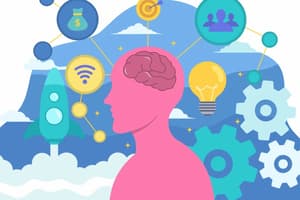Podcast
Questions and Answers
What does the Flynn Effect refer to?
What does the Flynn Effect refer to?
- The impact of early education on future intelligence levels
- The rise in IQ scores observed over the past several decades (correct)
- A method for calculating IQ based on environment
- A decrease in average IQ scores due to social stressors
Which psychometric principle ensures that test results are consistent across multiple administrations?
Which psychometric principle ensures that test results are consistent across multiple administrations?
- Validity
- Construct focus
- Standardization
- Reliability (correct)
What is a primary concern associated with stereotype threat?
What is a primary concern associated with stereotype threat?
- It can enhance performance through increased pressure.
- It can adversely affect performance due to anxiety. (correct)
- It increases the accuracy of standardized test scores.
- It eliminates biases in academic testing.
In the context of intelligence testing, what does a fixed mindset imply?
In the context of intelligence testing, what does a fixed mindset imply?
What is the primary aim of creating socio-culturally responsive assessments?
What is the primary aim of creating socio-culturally responsive assessments?
Which of the following is a type of test that measures what someone already knows?
Which of the following is a type of test that measures what someone already knows?
What is one of the criticisms regarding the use of IQ tests in educational and job settings?
What is one of the criticisms regarding the use of IQ tests in educational and job settings?
Which example illustrates a higher mental age in calculating IQ?
Which example illustrates a higher mental age in calculating IQ?
Which type of intelligence encompasses abilities such as problem-solving and adaptability to new situations?
Which type of intelligence encompasses abilities such as problem-solving and adaptability to new situations?
What historical method was used to calculate IQ scores?
What historical method was used to calculate IQ scores?
Which statement best describes the concept of general ability (g)?
Which statement best describes the concept of general ability (g)?
What does a high IQ score indicate?
What does a high IQ score indicate?
What is predictive validity concerned with?
What is predictive validity concerned with?
Which type of reliability measures the stability of test results over time?
Which type of reliability measures the stability of test results over time?
What characterizes stereotype threat?
What characterizes stereotype threat?
The Flynn Effect suggests that IQ scores have been
The Flynn Effect suggests that IQ scores have been
Achievement tests are primarily designed to measure what?
Achievement tests are primarily designed to measure what?
Which of the following is NOT a type of validity?
Which of the following is NOT a type of validity?
Individuals with a fixed mindset typically
Individuals with a fixed mindset typically
What does split-half reliability assess?
What does split-half reliability assess?
Stereotype lift positively influences performance primarily by
Stereotype lift positively influences performance primarily by
Standardization is essential for what reason?
Standardization is essential for what reason?
Which aspect of a test does construct validity primarily evaluate?
Which aspect of a test does construct validity primarily evaluate?
Flashcards
Intelligence is a single or multiple ability?
Intelligence is a single or multiple ability?
Debate exists on whether intelligence is a single general ability (g) or a collection of specific abilities like linguistic, logical-mathematical, and spatial.
IQ Test Calculation (Early)
IQ Test Calculation (Early)
Early IQ tests calculated IQ by dividing mental age by chronological age and multiplying by 100.
Standardization (Testing)
Standardization (Testing)
Ensuring consistent procedures and environments in test administration.
Validity (Assessment)
Validity (Assessment)
Signup and view all the flashcards
Reliability (Assessment)
Reliability (Assessment)
Signup and view all the flashcards
Socio-cultural Responsiveness in Assessment.
Socio-cultural Responsiveness in Assessment.
Signup and view all the flashcards
Stereotype Threat
Stereotype Threat
Signup and view all the flashcards
Flynn Effect
Flynn Effect
Signup and view all the flashcards
Within vs. Between Group Variability of IQ
Within vs. Between Group Variability of IQ
Signup and view all the flashcards
Achievement v. Aptitude Tests
Achievement v. Aptitude Tests
Signup and view all the flashcards
General Ability (g)
General Ability (g)
Signup and view all the flashcards
Intelligence Quotient (IQ)
Intelligence Quotient (IQ)
Signup and view all the flashcards
Standardization
Standardization
Signup and view all the flashcards
Validity
Validity
Signup and view all the flashcards
Construct Validity
Construct Validity
Signup and view all the flashcards
Predictive Validity
Predictive Validity
Signup and view all the flashcards
Reliability
Reliability
Signup and view all the flashcards
Test-retest Reliability
Test-retest Reliability
Signup and view all the flashcards
Split-half Reliability
Split-half Reliability
Signup and view all the flashcards
Stereotype Lift
Stereotype Lift
Signup and view all the flashcards
Achievement Tests
Achievement Tests
Signup and view all the flashcards
Aptitude Tests
Aptitude Tests
Signup and view all the flashcards
Fixed Mindset
Fixed Mindset
Signup and view all the flashcards
Growth Mindset
Growth Mindset
Signup and view all the flashcards
Study Notes
Defining and Measuring Intelligence
- Intelligence is a complex and debated concept, with researchers differing on whether it's a single general ability (g) or multiple specific abilities.
- Early intelligence tests calculated IQ by dividing mental age by chronological age.
- Modern IQ scores are often used to identify students for educational support programs.
- Example: A 10-year-old's mental age with an 8-year-old chronological age would have an IQ of 125.
Psychometric Principles for Intelligence Tests
- Standardized tests ensure fairness by using consistent procedures and environments.
- Example: Consistent administration in quiet conditions.
- Valid tests accurately measure what they aim to assess.
- Example: An intelligence test must measure intellectual ability, not unrelated traits.
- Reliable tests yield similar results upon repeated administration
- Example: Consistent scores on repeated administrations.
Socio-Cultural Responsiveness in Assessment
- Tests should be socio-culturally responsive to reduce potential bias.
- Stereotype threat negatively impacts performance due to social group stereotypes.
- Example: Students may underperform due to fears of confirming negative stereotypes.
The Flynn Effect
- The Flynn Effect is the rise in average IQ scores over recent decades.
- Possible factors contributing to this include higher socioeconomic status, improved healthcare, and better nutrition.
Within and Between-Group Variability in IQ Scores
- IQ scores vary more within groups than between groups.
- Personal and sociocultural biases affect interpretations and outcomes.
- Example: Poverty, discrimination, and lack of educational opportunities hinder intelligence scores.
Academic Tests and Mindset
- Achievement tests measure existing knowledge.
- Example: A final exam assesses subject knowledge in a course.
- Aptitude tests predict future performance.
- Example: The SAT aims to predict future academic success.
- Mindset can significantly influence academic success.
Fixed vs. Growth Mindset
- Fixed mindset: Believes intelligence is static and unchangeable.
- Example: Believing you can't improve in a subject due to inherent limitations.
- Growth mindset: Believes intelligence can develop with effort and experience.
- Example: Believing practice and effort can improve skills.
General Ability (g) and IQ
- General ability (g) is a theoretical construct representing the common factor in diverse cognitive tasks.
- IQ is a standardized measure of intelligence derived from test performance.
Psychometric Concepts (Validity, Reliability, Standardization)
- Standardization establishes norms and uniform procedures for administering and scoring tests.
- Validity measures what a test claims to measure. It has different types.
- Construct validity: Measures the intended theoretical construct.
- Predictive validity predicts future performance.
- Reliability measures test consistency over time. It has different types.
- Test-retest reliability: Consistency over repeated administrations.
- Split-half reliability: Measures internal consistency by dividing the test in half.
Stereotype Threat and Stereotype Lift
- Stereotype threat is the risk of performing poorly due to fear of confirming negative stereotypes about one's social group.
- Stereotype lift is the improvement in performance due to awareness of positive stereotypes.
Academic Testing: Achievement and Aptitude Tests
- Achievement tests measure existing knowledge.
- Aptitude tests predict future performance.
Mindset and Academic Achievement
- Fixed mindset, the belief that intelligence is static, diminishes the drive to improve.
- Growth mindset, the belief that intelligence is malleable, fosters perseverance and motivation.
Studying That Suits You
Use AI to generate personalized quizzes and flashcards to suit your learning preferences.
Description
Explore the concepts of intelligence and the principles underlying psychometric testing. This quiz covers definitions, historical approaches to IQ, and modern applications in educational support. Assess your understanding of the socio-cultural factors that impact intelligence assessment.




